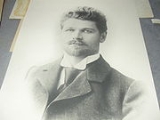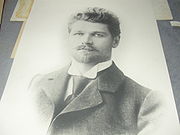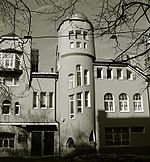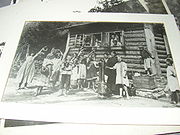
Stanislav Shatsky
Encyclopedia
Stanislav Shatskii (1878-1934) was an important late Tsarist and early Soviet humanistic educator, writer, and educational administrator.
 Shatskii established a number of experimental and progressive educational institutions between 1905 and 1934. A member of the Russian intelligentsia
Shatskii established a number of experimental and progressive educational institutions between 1905 and 1934. A member of the Russian intelligentsia
, Shatskii imported many of the values of late tsarist educational experimentation (many of which were based on the methods of American progressive education) into early Soviet approaches to creating a communist school and constructing 'a new Soviet person'.
His work as a communist educator complicates our understanding of the communist education. Shatskii, unlike those who would follow him, denied the primacy of politics and class struggle in the creation of a new communist man. He also resisted indoctrinational techniques, instead preferring to demonstrate to pupils the relevance and importance of a reasoned approach to life. For Shatskii, true communist education was the release of the individual from the strictures of the capitalist system. The importance of his work is only recently being recognized as many of his publications were suppressed by Stalin and the Soviet educational orthodoxy that sought to ensure that all 'communist education' had a class-based element. He deserves a place in Russian pedagogy with Anton Makarenko
and Lev Vygotsky.
He sought to build a liberal, child-centered version of communist education that drew on John Dewey
's activity-based educational methods and Lev Tolstoi's focus on an aesthetically based, free education. Placing these ideas in a Marxist framework, Shatskii hoped that a communist education - founded on the principles of cooperation and self-motivation - would release the child's innate potential and help him develop into a well-rounded human being. His ideal student was a child that appreciated art, culture, and music, yet also knew the value of a hard day's work: "A child of high culture with callused hands".
 His first major educational institution was The Settlement (Setlment) which was established in northern Moscow in 1905. This complex of institutions drew its ideological inspiration from the settlement movement
His first major educational institution was The Settlement (Setlment) which was established in northern Moscow in 1905. This complex of institutions drew its ideological inspiration from the settlement movement
. Specifically modelled on the Chicago-based Hull House
, where Shatskii's collaborator, architect Alexander Zelenko
had lived for a year, the Settlement was a complex of children's clubs and informal classes. At the center of the Settlement was the Zelenko-designed Communal Club for working children, opened in 1907 in Moscow's blue-collar North End (Vadkovsky Lane, 5) and funded by industrialist Nikolay Vtorov
. The Club was a part of a larger drive to set up a cultural and social center in remote working class district of Moscow (Miusskaya Square project).
The first of its kind in Tsarist Russia, the loose arrangement of institutions in the Settlement attracted intellectuals and businessmen who shared Shatskii's view that education was a non-violent path to healing the sores of a divided tsarist society. Due to police suspicion of seditious teaching and charges of communism
, the Settlement was closed down by police in May, 1908 (Zelenko ended up in jail for a few months). Later, Shatskii established a rural summer colony called The Invigorating Life (Бодрая жизнь, Bodraia zhizn') in rural Kaluga region (near Obninsk
), in which he stressed labor-based methods of education, creativity, and artistic expression.
 After the 1917 Russian Revolution
After the 1917 Russian Revolution
, Shatskii's initial opposition to Soviet power faded as Soviet authorities adopted many of values and ideas of educational progressivism
into their educational approach (see Declaration on the United Labor School in W. Rosenburg, Bolshevik Visions: First Phase of the Cultural Revolution, 1984). In 1919, he set up the First Experimental Station (Pervaia Opytnaia Stantsiia), which was a massive network of experimental institutions. Divided into Moscow
and Kaluga sections, this organization was vast, employing hundreds of teachers, incorporating village and city schools, libraries, children's clubs, reading huts, and demanding a large amount of resources from the government. This school complex would become the envy of international progressive educators and represented the largest, most radical experimental educational institution in the world. As Stalin sought to impose ideological control over the Soviet state, the First Experimental Station was reorganized by Soviet authorities in 1932 and Shatskii was removed from his position. Shatskii died of natural causes in 1934.
, developing programs for schools across Soviet Russia in his capacity as one of the leaders of the pedagogical section of the State Academic Council (Glavny Uchyony Sovet). His meteoric rise to power suggested the importance of the Russian educational intelligentsia
to early Soviet governance. Shatskii eventually joined the Communist Party in 1928, but Joseph Stalin
's 'Great Break' of 1928 removed Shatskii and other like-minded intellectuals from positions of power within the educational apparatus. Shatskii's First Experimental Station would be closed down by Soviet power in 1932 as part of the Stalinist shift to a more ideological approach to education. Shatskii himself died 30 October, 1934, as rumors circulated that he was going to be sent to the gulag.
. Currently, many of Shatskii's ideas are being rehabilitated in Russia (most notably, Feliks Fradkin and Gennadii Malinin have published books and articles on Shatskii's hidden legacy - see below). Furthermore, an annual conference in Obninsk, Russia (not far from Shatskii's Kaluga-based schools of the First Experimental Station) is convened in his honor. Finally, in the west, Shatskii has been the subject of recent articles in the Slavonic and East European Review (October, 2004), the Journal of the Oxford University History Society (2005), and the History of Education (see below)
, particularly John Dewey
. During the Soviet period, Shatskii would be influenced by Marxism
, blending his own liberational, progressive educational ideas with Marx's materialist approach.
Pedagogicheskie sochineniia, 4 vols. 1962-1965.
A Teacher’s Experience: A Collection. Translated into English by Catherine Judelson. 1981.
Vladimir Beliaev. Stanovlenie i Razvitie Innovatsionnoi Kontseptsii S. T. Shatskogo. Moscow, 1999.
Kevin. J. Brehony Representations of Socialist educational experiments in the 1920s and 1930s: The place of the Sciences of Education in R. Hofstetter and B. Schneuwly (Eds). Passion, fusion, tension. New Education and Educational sciences - Education nouvelle et Sciences de l'éducation (end 19th-middle 20th century - fin 19e-milieu 20e siècle. Bern, Peter Lang: 2006. 271-304.
Feliks Fradkin and Gennadii Malinin. Vospitatel'naia Sistema S. T. Shatskogo. Moscow, 1993.
Feliks Fradkin. "S. T. Shatskii’s Last Years", in School and Society in Tsarist and Soviet Russia, B. Elkof (ed.) Basingstoke, 1993.
William Partlett. "The Cultural Revolution in the Village School: S. T. Shatskii’s Kaluga School Complex, 1919-1932." Journal of the Oxford University History Society. No. 3, Michaelmas 2005.
http://users.ox.ac.uk/~jouhs/michaelmas2005/Partlett03.htm
William Partlett. "Breaching Cultural Worlds with the Village School: Educational Visions, Local Initiative, and Rural Experience at S.T. Shatsky’s Kaluga School System, 1919-1931." Slavonic and East European Review, Vol 82, No. 4, October, 2004: 847-885.
William Partlett. "Bourgeois Ideas in Communist Construction: The Development of Stanislav Shatskii's Teacher Training Methods." History of Education 35, 2006: 453-474.
Yordanka Valkanova, and Kevin J. Brehony "The 'Gifts' and 'Contributions'. Friedrich Froebel and Russian education from 1850 to 1920." History of Education 35(2) 2006: 189-207.

Intelligentsia
The intelligentsia is a social class of people engaged in complex, mental and creative labor directed to the development and dissemination of culture, encompassing intellectuals and social groups close to them...
, Shatskii imported many of the values of late tsarist educational experimentation (many of which were based on the methods of American progressive education) into early Soviet approaches to creating a communist school and constructing 'a new Soviet person'.
His work as a communist educator complicates our understanding of the communist education. Shatskii, unlike those who would follow him, denied the primacy of politics and class struggle in the creation of a new communist man. He also resisted indoctrinational techniques, instead preferring to demonstrate to pupils the relevance and importance of a reasoned approach to life. For Shatskii, true communist education was the release of the individual from the strictures of the capitalist system. The importance of his work is only recently being recognized as many of his publications were suppressed by Stalin and the Soviet educational orthodoxy that sought to ensure that all 'communist education' had a class-based element. He deserves a place in Russian pedagogy with Anton Makarenko
Anton Makarenko
Anton Semenovych Makarenko was a Ukrainian and Soviet educator and writer, who promoted democratic ideas and principles in educational theory and practice. As one of the founders of Soviet pedagogy, he elaborated the theory and methodology of upbringing in self-governing child collectives and...
and Lev Vygotsky.
He sought to build a liberal, child-centered version of communist education that drew on John Dewey
John Dewey
John Dewey was an American philosopher, psychologist and educational reformer whose ideas have been influential in education and social reform. Dewey was an important early developer of the philosophy of pragmatism and one of the founders of functional psychology...
's activity-based educational methods and Lev Tolstoi's focus on an aesthetically based, free education. Placing these ideas in a Marxist framework, Shatskii hoped that a communist education - founded on the principles of cooperation and self-motivation - would release the child's innate potential and help him develop into a well-rounded human being. His ideal student was a child that appreciated art, culture, and music, yet also knew the value of a hard day's work: "A child of high culture with callused hands".
Tsarist-era educational projects

Settlement movement
The settlement movement was a reformist social movement, beginning in the 1880s and peaking around the 1920s in England and the US, with a goal of getting the rich and poor in society to live more closely together in an interdependent community...
. Specifically modelled on the Chicago-based Hull House
Hull House
Hull House is a settlement house in the United States that was co-founded in 1889 by Jane Addams and Ellen Gates Starr. Located in the Near West Side of , Hull House opened its doors to the recently arrived European immigrants. By 1911, Hull House had grown to 13 buildings. In 1912 the Hull...
, where Shatskii's collaborator, architect Alexander Zelenko
Alexander Zelenko
Alexander Ustinovich Zelenko , 1871–1953, was a Russian and Soviet architect and educator, a pioneer in settlement movement and vocational education...
had lived for a year, the Settlement was a complex of children's clubs and informal classes. At the center of the Settlement was the Zelenko-designed Communal Club for working children, opened in 1907 in Moscow's blue-collar North End (Vadkovsky Lane, 5) and funded by industrialist Nikolay Vtorov
Nikolay Vtorov
Nikolay Alexandrovich Vtorov was a Russian businessman, notable as Russia's wealthiest man on the eve of World War I ....
. The Club was a part of a larger drive to set up a cultural and social center in remote working class district of Moscow (Miusskaya Square project).
The first of its kind in Tsarist Russia, the loose arrangement of institutions in the Settlement attracted intellectuals and businessmen who shared Shatskii's view that education was a non-violent path to healing the sores of a divided tsarist society. Due to police suspicion of seditious teaching and charges of communism
Communism
Communism is a social, political and economic ideology that aims at the establishment of a classless, moneyless, revolutionary and stateless socialist society structured upon common ownership of the means of production...
, the Settlement was closed down by police in May, 1908 (Zelenko ended up in jail for a few months). Later, Shatskii established a rural summer colony called The Invigorating Life (Бодрая жизнь, Bodraia zhizn') in rural Kaluga region (near Obninsk
Obninsk
Obninsk is a city in Kaluga Oblast, Russia, located southwest of Moscow. Population: Obninsk is one of the major Russian science cities. The first nuclear power plant in the world for the large-scale production of electricity opened here on June 27, 1954, and it also doubled as a training...
), in which he stressed labor-based methods of education, creativity, and artistic expression.
Soviet-era experimentation: The First Experimental Station

Russian Revolution of 1917
The Russian Revolution is the collective term for a series of revolutions in Russia in 1917, which destroyed the Tsarist autocracy and led to the creation of the Soviet Union. The Tsar was deposed and replaced by a provisional government in the first revolution of February 1917...
, Shatskii's initial opposition to Soviet power faded as Soviet authorities adopted many of values and ideas of educational progressivism
Educational progressivism
Progressive education is a pedagogical movement that began in the late nineteenth century and has persisted in various forms to the present. More recently, it has been viewed as an alternative to the test-oriented instruction legislated by the No Child Left Behind educational funding act...
into their educational approach (see Declaration on the United Labor School in W. Rosenburg, Bolshevik Visions: First Phase of the Cultural Revolution, 1984). In 1919, he set up the First Experimental Station (Pervaia Opytnaia Stantsiia), which was a massive network of experimental institutions. Divided into Moscow
Moscow
Moscow is the capital, the most populous city, and the most populous federal subject of Russia. The city is a major political, economic, cultural, scientific, religious, financial, educational, and transportation centre of Russia and the continent...
and Kaluga sections, this organization was vast, employing hundreds of teachers, incorporating village and city schools, libraries, children's clubs, reading huts, and demanding a large amount of resources from the government. This school complex would become the envy of international progressive educators and represented the largest, most radical experimental educational institution in the world. As Stalin sought to impose ideological control over the Soviet state, the First Experimental Station was reorganized by Soviet authorities in 1932 and Shatskii was removed from his position. Shatskii died of natural causes in 1934.
Educational leadership
Shatskii also became an important educational leader in the Soviet UnionSoviet Union
The Soviet Union , officially the Union of Soviet Socialist Republics , was a constitutionally socialist state that existed in Eurasia between 1922 and 1991....
, developing programs for schools across Soviet Russia in his capacity as one of the leaders of the pedagogical section of the State Academic Council (Glavny Uchyony Sovet). His meteoric rise to power suggested the importance of the Russian educational intelligentsia
Intelligentsia
The intelligentsia is a social class of people engaged in complex, mental and creative labor directed to the development and dissemination of culture, encompassing intellectuals and social groups close to them...
to early Soviet governance. Shatskii eventually joined the Communist Party in 1928, but Joseph Stalin
Joseph Stalin
Joseph Vissarionovich Stalin was the Premier of the Soviet Union from 6 May 1941 to 5 March 1953. He was among the Bolshevik revolutionaries who brought about the October Revolution and had held the position of first General Secretary of the Communist Party of the Soviet Union's Central Committee...
's 'Great Break' of 1928 removed Shatskii and other like-minded intellectuals from positions of power within the educational apparatus. Shatskii's First Experimental Station would be closed down by Soviet power in 1932 as part of the Stalinist shift to a more ideological approach to education. Shatskii himself died 30 October, 1934, as rumors circulated that he was going to be sent to the gulag.
Shatskii's legacy
Most of Shatskii's work was suppressed by Stalinist officials as the progressive approach of the Soviet Union in the 1920s was redrawn as heretical and bourgeois, but his emphasis on activity and the joy of learning could be found in later Soviet pedagogues, including SukhomlinskySukhomlinsky
Vasyl Olexandrovych Sukhomlynsky was a Ukrainian humanistic educator in the Soviet Union who saw the aim of education in producing a truly humane being.- Biography :...
. Currently, many of Shatskii's ideas are being rehabilitated in Russia (most notably, Feliks Fradkin and Gennadii Malinin have published books and articles on Shatskii's hidden legacy - see below). Furthermore, an annual conference in Obninsk, Russia (not far from Shatskii's Kaluga-based schools of the First Experimental Station) is convened in his honor. Finally, in the west, Shatskii has been the subject of recent articles in the Slavonic and East European Review (October, 2004), the Journal of the Oxford University History Society (2005), and the History of Education (see below)
Ideological influences
Shatskii drew a great deal on American Educational progressivismEducational progressivism
Progressive education is a pedagogical movement that began in the late nineteenth century and has persisted in various forms to the present. More recently, it has been viewed as an alternative to the test-oriented instruction legislated by the No Child Left Behind educational funding act...
, particularly John Dewey
John Dewey
John Dewey was an American philosopher, psychologist and educational reformer whose ideas have been influential in education and social reform. Dewey was an important early developer of the philosophy of pragmatism and one of the founders of functional psychology...
. During the Soviet period, Shatskii would be influenced by Marxism
Marxism
Marxism is an economic and sociopolitical worldview and method of socioeconomic inquiry that centers upon a materialist interpretation of history, a dialectical view of social change, and an analysis and critique of the development of capitalism. Marxism was pioneered in the early to mid 19th...
, blending his own liberational, progressive educational ideas with Marx's materialist approach.
Shatskii's major works
Bodraia Zhizn'. 1908.Pedagogicheskie sochineniia, 4 vols. 1962-1965.
A Teacher’s Experience: A Collection. Translated into English by Catherine Judelson. 1981.
Works about Shatskii
D. Bershadskaia. Pedagogicheskie vzgliady i deiatel’nost S. T. Shatskogo (Moscow, 1960)Vladimir Beliaev. Stanovlenie i Razvitie Innovatsionnoi Kontseptsii S. T. Shatskogo. Moscow, 1999.
Kevin. J. Brehony Representations of Socialist educational experiments in the 1920s and 1930s: The place of the Sciences of Education in R. Hofstetter and B. Schneuwly (Eds). Passion, fusion, tension. New Education and Educational sciences - Education nouvelle et Sciences de l'éducation (end 19th-middle 20th century - fin 19e-milieu 20e siècle. Bern, Peter Lang: 2006. 271-304.
Feliks Fradkin and Gennadii Malinin. Vospitatel'naia Sistema S. T. Shatskogo. Moscow, 1993.
Feliks Fradkin. "S. T. Shatskii’s Last Years", in School and Society in Tsarist and Soviet Russia, B. Elkof (ed.) Basingstoke, 1993.
William Partlett. "The Cultural Revolution in the Village School: S. T. Shatskii’s Kaluga School Complex, 1919-1932." Journal of the Oxford University History Society. No. 3, Michaelmas 2005.
http://users.ox.ac.uk/~jouhs/michaelmas2005/Partlett03.htm
William Partlett. "Breaching Cultural Worlds with the Village School: Educational Visions, Local Initiative, and Rural Experience at S.T. Shatsky’s Kaluga School System, 1919-1931." Slavonic and East European Review, Vol 82, No. 4, October, 2004: 847-885.
William Partlett. "Bourgeois Ideas in Communist Construction: The Development of Stanislav Shatskii's Teacher Training Methods." History of Education 35, 2006: 453-474.
Yordanka Valkanova, and Kevin J. Brehony "The 'Gifts' and 'Contributions'. Friedrich Froebel and Russian education from 1850 to 1920." History of Education 35(2) 2006: 189-207.

